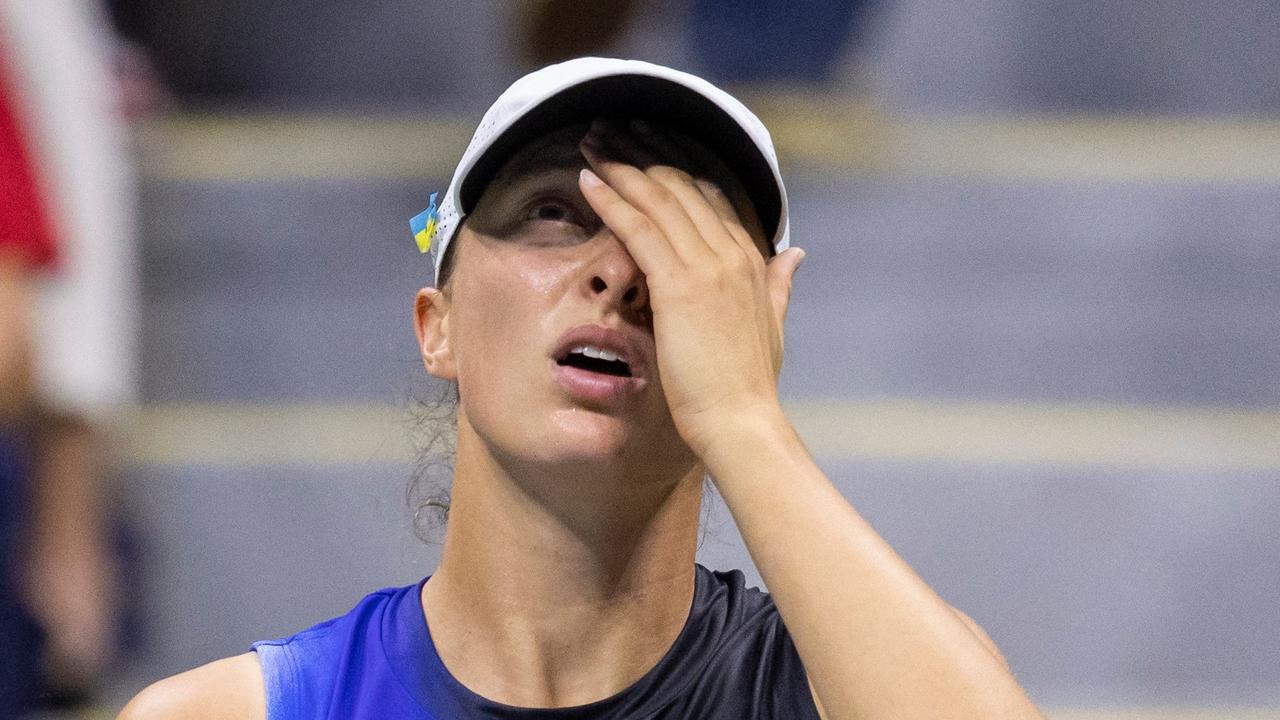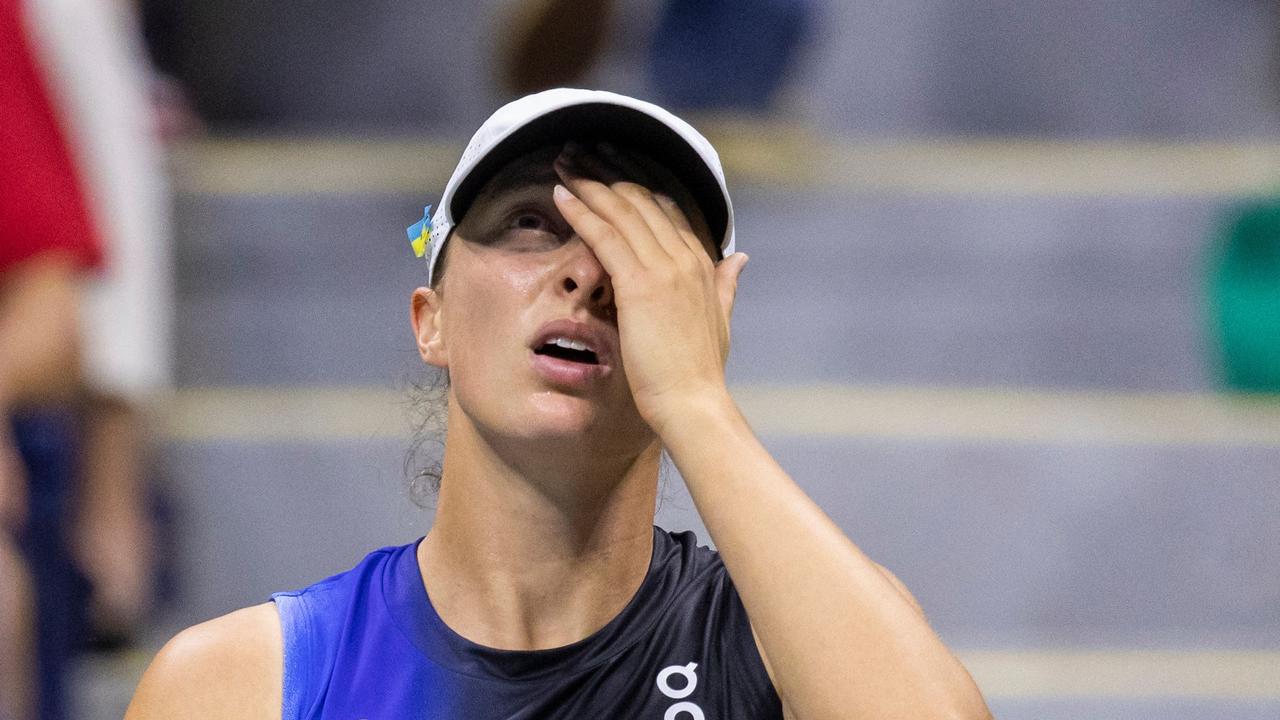World No. 1 tennis champ in doping ban bombshell
The tennis world has been rocked with a storm exploding over details behind the doping ban handed to one of the sport’s biggest stars.

The tennis world has been rocked by news Iga Swiatek has been handed a ban after failing a doping test earlier this year.
The International Tennis Integrity Agency (ITIA) announced on Friday morning (AEDT) Swiatek has accepted a one-month suspension after testing positive for a banned substance.
The 23-year-old tested positive for the heart medication trimetazidine (TMZ) in an out-of-competition sample in August 2024 when the Polish player was ranked number one in the world.
TMZ is the drug at the centre of the case involving 23 Chinese swimmers who remained eligible despite testing positive for performance enhancers in 2021.
The current world No. 2’s bombshell news comes just months after her triumph at the 2024 French Open.
She is free and clear to compete at the Australian Open in January.
The ITIA accepted that she had consumed a banned substance through “the contamination of a regulated non-prescription medication (melatonin), manufactured and sold in Poland that the player had been taking for jet lag and sleep issues”.
“The violation was therefore not intentional... the player’s level of fault was considered to be at the lowest end of the range for ‘No Significant Fault or Negligence’,” the ITIA said.
Reigning French Open champion Swiatek, who has five Grand Slam singles titles — four at Roland Garros and the 2022 US Open — accepted the suspension.
She said it has been the “hardest experience” she has ever faced.
“I’m finally allowed... so I instantly want to share with you something that became the worst experience of my life,” an emotional Swiatek said in a post on social media.

“In the last two-and-a-half months I was subject to strict ITIA proceedings, which confirmed my innocence.
“The only positive doping test in my career, showing unbelievably low level of a banned substance I’ve never heard about before, put everything I’ve worked so hard for my entire life into question.
“Both me and my team had to deal with tremendous stress and anxiety. Now everything has been carefully explained, and with a clean slate I can go back to what I love most.”
Swiatek was provisionally suspended from September 22 until October 4, missing three tournaments, which counts towards the sanction, leaving eight days remaining.
She will also forfeit prize money from the Cincinnati Open, the tournament directly following the test, where she lost to Aryna Sabalenka in the final.
That constitutes a $158,944 hit to the hip pocket.
“I know I will be stronger than ever,” continued Swiatek. “Right now I’m just relieved it’s over.
“I want to be open with you, even though I know I did nothing wrong. Out of respect for my fans and the public, I’m sharing all the details of this longest and toughest tournament of my career. My biggest hope is that you will stay with me.”
In a case similar to that of men’s world number one Jannik Sinner, Swiatek nevertheless remains under threat of a World Anti-Doping Agency (WADA) appeal.

“WADA will carefully review this decision and reserves the right to take an appeal to the Court of Arbitration for Sport, as appropriate,” a spokesperson told AFP.
Italian Sinner is still waiting for the outcome of the WADA appeal against his initial exoneration for twice testing positive for traces of the steroid clostebol in March.
On Thursday, the ITIA said that Swiatek’s positive test was not initially made public “in accordance with its regulations”, since she appealed her provisional suspension within the allotted time and had it lifted.
“Once the source of the TMZ had been established, it became clear that this was a highly unusual instance of a contaminated product, which in Poland is a regulated medicine,” said ITIA CEO Karen Moorhouse.
“This case is an important reminder for tennis players of the strict liability nature of the World Anti-Doping Code and the importance of players carefully considering the use of supplements and medications.” The Women’s Tennis Association (WTA) said it “fully supports Iga during this difficult time”.
“Iga has consistently demonstrated a strong commitment to fair play and upholding the principles of clean sport, and this unfortunate incident highlights the challenges athletes face in navigating the use of medications and supplements,” the WTA said in a statement.
“The WTA remains steadfast in our support for a clean sport and the rigorous processes that protect the integrity of competition.
“We also emphasise that athletes must take every precaution to verify the safety and compliance of all products they use, as even unintentional exposure to prohibited substances can have significant consequences.”
Tennis world reacts to Swiatek bombshell
Outrage and scepticism has dominated knee-jerk reactions from tennis commentators around the world.
Following Sinner’s short-term ban, there have been public calls for doping processes to be made more transparent.
British tennis star Tara Moore, who received a 24-month ban for violating doping rules was clearly furious about the short-term ban.
Moore was suspended in 2022 and missed 19 months on the tennis circuit before a doping violation backflip when an independent tribunal panel ruled that the source of the performance enhancing drugs found in her test samples was contaminated meat eaten in South America.
“When will the WTA, ATP Tour, ITF, Wimbledon, US Open, Roland Garros and Australian Open investigate the ITIA and their procedures for a more fair, open approach? The players cannot do this alone,” she wrote on Twitter.
“Players are afraid of the institutions that are supposed to protect us! Ask them.”

She also wrote: “I took 19 months off as I had to make a “change to my team” too guys.
“Let’s not forget, mine was also contamination, and 2 other people also tested positive yet ITIA are appealing my case. Why is no one seriously looking into the corruption of the organisations that govern us?”
Canadian star Denis Shapovalov wrote a simple message that has raised eyebrows.
“1 month ban eh,” he wrote on social media.
Leading tennis reporter Jose Morgado described it as a “terrible look for the sport” after sharing a message posted by the Wuhan Open last month that stated Swiatek missed the tournament to “take time off after changes to her “team”.
“This is one of the reasons cited by an official tournament account for Iga Swiatek’s withdrawal,” he wrote.
“Again, not much transparency in these situations. Like in the Sinner’s case, I hope we move on and they can play as tennis is MUCH BETTER with both of them.
“But all of this is a terrible look for the sport.”
Journalist Stuart Fraser also posted: “Oh dear. Another provisional suspension we knew nothing about. Swiatek had cited fatigue, personal matters and a coaching change as the reasons at the time for three tournament withdrawals”.
American star Taylor Fritz, who has risen up to No. 4 on the ATP Tour rankings, also hit out at the doping storm as speculation and rumours spread across cyberspace.
“What drives me CRAZY about these situations (in terms of going on X) is not the actual cases themselves,” he posted on social media.
“It’s tough to know exactly what happened/all the details in these specific instances, so the speculation talk isn’t really my favourite thing to do. It’s fine to have your own honest opinions but what I can’t fathom and what is so upsetting to see as a player, is the INSANE bias from the tennis public supporting whatever story pushes the agenda they want to be pushed.
“If it’s a rival of the player you support that tests positive then you are on team “let’s call them a doper/cheater/disgrace them as much as possible” and if it’s your fav player that it’s about then it’s “innocent no questions asked”.
“How are you not able to remove your own personal bias and form an educated and honest opinion for yourself?
“Even if as the player, you can prove your innocence (not saying anyone is or isn’t) people that support rival players/have bias against you will always blindly push the narrative you are a cheater, and that fact really makes me sad for all the true innocent players that have to go through this.”
Details emerge of how Swiatek avoided long-term ban
Iga Swiatek was successfully able to prove that there was no fault or negligence in how the substance entered her system.
According to a statement, Swiatek had first been introduced to the contaminated product in 2019 when assigned by a physician to help her sleep.
Her psychologist submitted a statement and bank records to show the product was purchased legitimately off the shelf of pharmacies in Poland.
The statement shows Swiatek took 2-3 tablets on August 12 to help her sleep and was woken by testing agents 4-5 hours later.
The product and its active ingredient were not detected in the samples she provided during the Paris Olympics.
— with AFP






